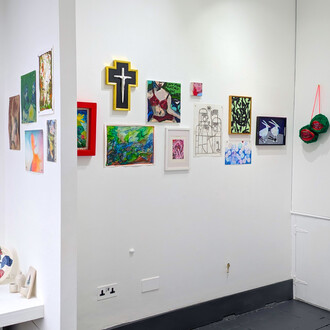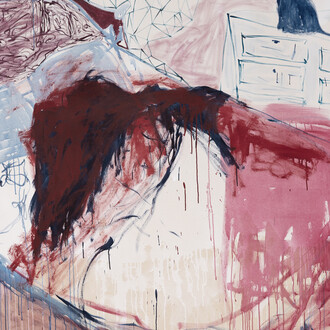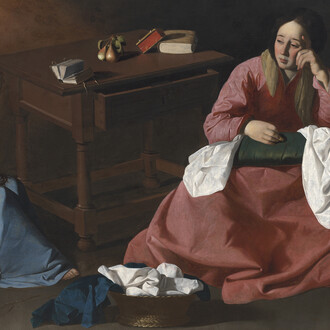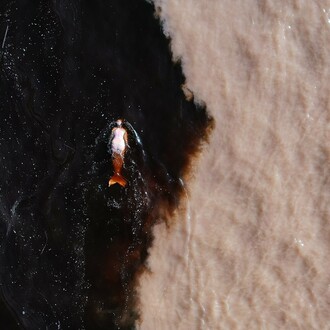Ein kaltes Herz kann nie glücklich sein [A cold heart can never be happy] is a homage to a heart at odds with itself. The cupboard reveals an intimate space housing a ceramic vessel, an object resembling the shape of a well, sealed with an aluminium plate. Through this mirrored surface we enter into the process of searching, animating the viewer to look into their distorted image and decipher what stares back. The well draws on its representation within folklore, wishing wells have historically been used as places that provide answers, give direction, and offer hope. Within the context of the exhibition, the well occupies a similar position as a place of contemplation and searching.
The title of the exhibition was taken from a diary entry written in German by De Caluwé’s great-grandfather, offering a self portrait of sorts, a description of himself that captured part of him. It offers a rare connection to him for the artist. Within this body of work, De Caluwé considers identity as something that bleeds through generations—both as hereditary and as an evolving concept assembled through experiences, love, friendships, family, and environment. Identity is considered as something pliable, a thing that can be twisted, bent and reflected back at you. It is understood as a plurality, encompassing the multiple selves we carry and the distorted image that forms. Visitors are encouraged to look into the well, reflecting on the fluid and fragile nature of self.
In keeping with the rituals surrounding holy wells, visitors are invited to leave offerings. In this case, the offerings consist of writing one sentence about themselves, to capture parts of who they are at that moment, and slide these into a traditional handmade terracotta money box kept at the gallery. The offerings will be kept in the money box until it is broken open, for the sentences to be transcribed and included in a publication later this year. This publication, which will be riso printed and hand bound, will include images of the making of the money box, a foreword, images of the breaking of the box and the literary self portraits visitors left behind.
German artist Zoe De Caluwé's (they/them, b. 1997, Hamburg, Germany) diverse practice encompasses sculpture, painting, and found objects. They unite these different genres through a craft-based approach to their creative process. Informed by memory and emotion, they create consciously flawed and playful pieces that delve into themes of identity and anxiety, evoking a deep sense of melancholy.
When De Caluwé immigrated to the UK in their teens they learned English through informal conversation. In their artistic practice, akin to their experience of language, informal processes seamlessly intertwine with their unique vernacular, becoming integral to the essence of their work. While having an academically informed understanding of art history, their practice is rooted in experimentation rather than formal training.
Zoe De Caluwé undertook their Art History masters at Oxford University in 2022 and is now based in Margate. They have previously exhibited with TRA Collective, Irving Gallery, Gallery at Home and The Lido Stores.












